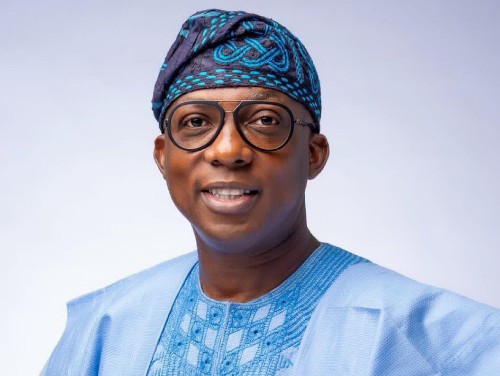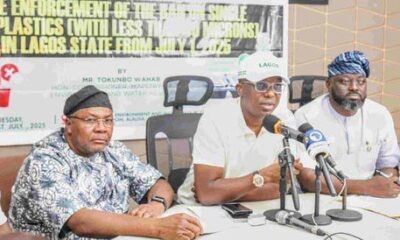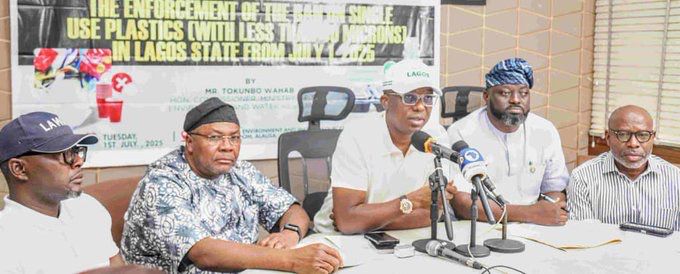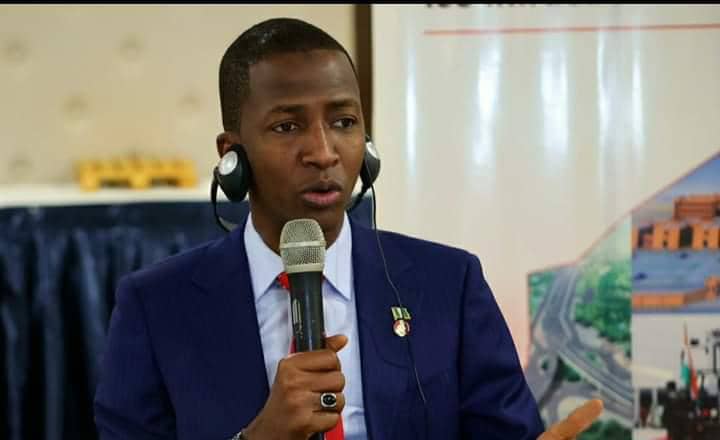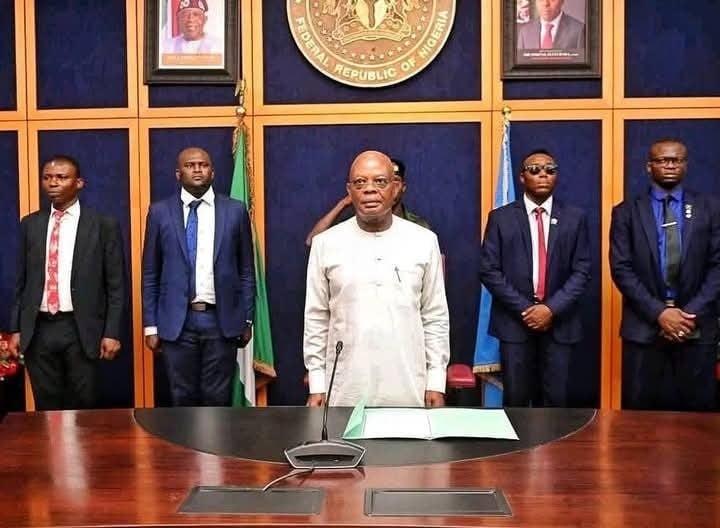In a city where the line between order and chaos is as thin as a mangrove’s root, Tokunbo Wahab, Lagos’ Commissioner for the Environment and Water Resources, has chosen a path few leaders dare tread. His methods—deemed draconian by critics—have drawn protests, lawsuits, and vitriol. Bulldozers demolish illegal markets. Styrofoam vendors are cautioned. Yet beneath the clamor lies an inconvenient truth: In a megacity teetering on ecological collapse, Wahab’s unyielding resolve may be Lagos’ last, best hope.
When he was moved up to the helm by the Leadership Genius, Babajide Sanwo-olu, it wasn’t a conceivable choice. Who goes from being in charge of Education to the hotbed that is Environment and Water resources in Lagos? That appointment has made a lot of changes in Lagos as we know it. It’s that conspicuous.
To dismiss him as a tyrant with a wrecking ball is to ignore the stakes. Lagos, a metropolis of 24 million, is drowning. Annual floods displace 2 million residents. Coastal erosion swallows 3 meters of shoreline each year. Drainage channels, clogged by decades of plastic and apathy, turn streets into rivers. Against this backdrop, Wahab’s approach, rooted in urgency, not compromise, is not cruelty but clarity.
Lagos generates over 13,000 metric tonnes of waste daily—an overwhelming figure that threatens the city’s infrastructure and quality of life. Tokunbo Wahab has led an aggressive but strategic campaign to restructure waste management through a sustainable circular economy.
The state is shifting from a linear “collect-and-dump” model to a system where waste is treated as a resource. Under his leadership, the Lagos State Government has signed a number of strategic MOUs with international partners like Lafarge Africa, Harvest Waste Consortium, and Belstar Capital to convert solid and liquid waste into energy and recyclable materials.
A flagship project includes the construction of a 60–80MW Waste-to-Energy plant on the Epe landfill capable of consuming 2,500 tonnes of waste daily, providing both clean energy and waste reduction.
A separate MoU signed with Belstar and ENKA Consortium will address water infrastructure through the construction and rehabilitation of waterworks across the state.
In August 2024, citing the encroachment of some part of the Alaba International Market, a sprawling electronics hub built had encroached on the Ojo Creek floodplain, something had to be done. The move displaced traders and ignited outrage. Critics called it “anti-poor,” but the commissioner’s rationale was irrefutable: Hydrological studies showed the market’s location blocked a critical drainage corridor, putting 70% of Ojo at risk of submersion by 2030.
Similar operations followed. In Lekki Phase II, luxury estates built on protected wetlands were removed. In Mushin, illegal dumpsites were cleared. Each action sparked fury—yet each was backed by laws ignored for decades. “We cannot prioritize individual convenience over collective survival,” Wahab argued.
His critics call it wicked; his supporters see a leader finally enforcing rules long flouted by the powerful and the poor alike. ‘
Flood durations in cleared areas like Ikorodu-Itamaga have dropped by 40%. Drainage capacity, per the World Bank, has increased by 25% since 2023. For residents like Funke Adeyemi, whose home in Agege flooded annually for a decade, the change is visceral. “Last rainy season, our floors stayed dry. That’s worth the noise on Twitter,” she said.
Lagos environmenal reforms have not come without resistance. His crackdown on illegal structures in flood-prone areas, like those seen in Alaba International Market, Lekki Phase II, and under major bridges—has drawn significant public backlash. But these actions are backed by long-ignored environmental laws and hydrological studies. The demolitions are part of a larger flood control framework that includes the deflooding of major drain channels across all local governments.
- The Pragmatism of Prevention
Wahab’s critics accuse him of prioritizing punishment over solutions. Yet his policies are laced with foresight. The “Drain Lagos” project, a $17 million overhaul of the city’s drainage system, targets 32 flood-prone zones with reinforced concrete canals and solar-powered pumps. The Dutch-funded “Living with Water” initiative, set to break ground in 2025, will armor the coastline with seawalls and mangroves: a blend of foreign expertise and local grit.
Even his war on Styrofoam, mocked as elitist, has yielded dividends. Plastic waste in drains has dropped 60%, and partnerships with local startups are scaling production of biodegradable alternatives. “Change is painful, but stagnation is fatal,” Wahab said in a September address. “We cannot cling to convenience while our children inherit a wasteland.”
Wahab’s tactics are not unique—they are necessary. Wahab’s sin, it seems, is treating the crisis like a crisis. Without fear or favour, he has dispelled the myth that only the poor bear the brunt of enforcement. “No one is above the law,” he stated—a mantra that resonates in a city weary of inequality. Even critics concede his impartiality. “He’s tough, but he’s fair,” admitted Tunde Alabi, an urban planner who opposed the Alaba operation.
- A Model for Africa’s Megacities
Lagos is a bellwether. By 2100, 13 of the world’s 20 largest cities will be in Africa—all facing Lagos’ trifecta of population growth, climate vulnerability, and infrastructural decay. Wahab’s playbook—enforce laws, partner globally, prioritize infrastructure—is a blueprint for the continent.
The World Bank has praised his “transformative rigor.” Dutch engineers hail his “unsentimental pragmatism.” Even protesters, grudgingly, admit his impact. “I lost my shop, but my children won’t swim to school,” said an Alaba trader.
Amid the rubble, Wahab’s ministry unveiled a softer initiative in October: a solar-powered floating school in Makoko, built on recycled plastic pontoons. Funded by the UNDP, the pilot project educates 200 children while teaching climate adaptation—a nod to the slum’s vulnerability. But for Makoko residents like Emmanuel Sheku, the gesture feels hollow. “We need drainage systems, not floating classrooms,” he said. “Our boats sink yearly. Will this school stop the floods?”
- The Unpopular Architect of Tomorrow
Tokunbo Wahab is no saint. His policies bruise. His tone uncompromising. Yet in a region where leaders too often confuse compassion with complacency, he stands apart, a steward willing to absorb outrage today to gift Lagos a tomorrow.
Wahab’s vision is undeniably bold. He has leveraged legal acumen and political will to confront issues that his predecessors buried under empty rhetoric. Early data show flood reductions in targeted areas; plastic waste in drains has dropped.
The road ahead remains fraught. Compensation must accelerate. Grassroots voices must shape policy. But for the first time in decades, Lagos has a leader treating its environmental crisis with the urgency it demands. The city’s survival hinges on a simple equation: short-term pain for long-term salvation. Wahab, flaws and all, is solving it.
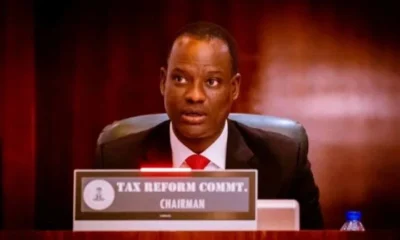
 BIG STORY5 days ago
BIG STORY5 days ago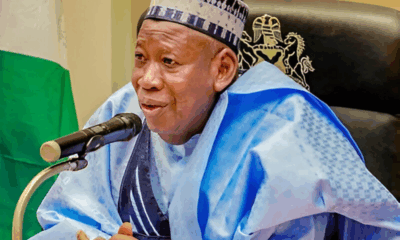
 BIG STORY4 days ago
BIG STORY4 days ago
 BIG STORY18 hours ago
BIG STORY18 hours ago
 BIG STORY5 days ago
BIG STORY5 days ago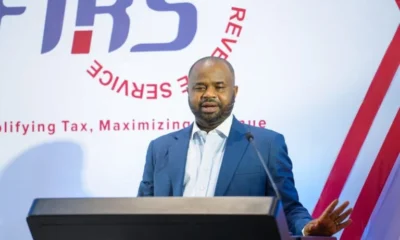
 BIG STORY5 days ago
BIG STORY5 days ago
 BIG STORY5 days ago
BIG STORY5 days ago
 BIG STORY16 hours ago
BIG STORY16 hours ago
 BIG STORY2 days ago
BIG STORY2 days ago




